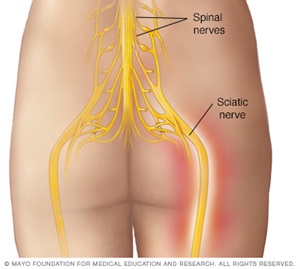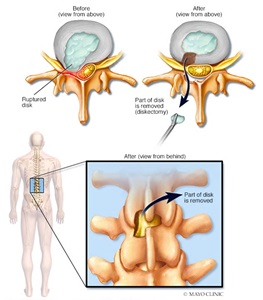
brain, nerve and spine experts.
Spine & Neurological Surgery
Sciatica Treatment in New Prague
Sciatica refers to pain that radiates along the path of the sciatic nerve, which branches from your lower back through your hips and buttocks and down each leg. Typically, sciatica affects only one side of your body.
Sciatica most commonly occurs when a herniated disk, bone spur on the spine or narrowing of the spine (spinal stenosis) compresses part of the nerve. This causes inflammation, pain and often some numbness in the affected leg. Although the pain associated with sciatica can be severe, most cases resolve with nonoperative treatments in a few weeks.

Diskectomy
People who have severe sciatica that's associated with significant leg weakness or bowel or bladder changes might be candidates for surgery to remove a portion of the disk that is pressing on the pinched nerve. In many cases, surgeons can remove just the protruding portion of the disk during procedure called a diskectomy, which is a surgical procedure to remove the damaged portion of a herniated disk in your spine. A herniated disk can irritate or compress nearby nerves. Diskectomy is most effective for treating pain that radiates down your arms or legs. It is performed to relieve the pressure a herniated disk — also called a slipped, ruptured or bulging disk, or disk prolapse — places on a spinal nerve.
Some patients may be candidates for the procedure to be performed through minimally invasive techniques. During a minimally invasive diskectomy, part of the damaged disk is removed using small tools or using a laser to remove part of the disk. Using minimally invasive techniques result in smaller incisions, lower risk of infection, and for many people, a quicker recovery.
